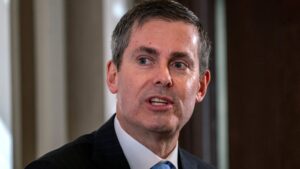Eli Lilly’s CEO David Ricks Addresses National Security and Pharmaceutical Tariffs
In a recent address at the Economic Club of New York, Eli Lilly and Company’s CEO, David Ricks, emphasized the pharmaceutical industry’s role in addressing national security concerns as discussions around potential tariffs on imported medications escalate. This conversation comes amidst a broader investigation by the Trump administration into how the importation of certain drugs affects U.S. national security.
The Context of Pharmaceutical Tariffs
The administration’s Section 232 investigation could foreshadow the imposition of tariffs aimed at bolstering domestic pharmaceutical production. However, details on which drugs will be affected—whether they be branded or generic—remain murky. A significant number of generic drugs are produced overseas, mainly in countries like India and China, raising concerns about supply chains.
Ricks pointed out that essential medications, particularly those that are older and cheaper, comprise about 90% of prescriptions in the U.S. These include critical hospital care drugs such as antibiotics and vasopressors. He voiced a commitment from Eli Lilly to contribute "to the country if we’re in need," suggesting a willingness to collaborate with the government to address potential shortages.
Exploring Solutions Beyond Tariffs
While Ricks expressed validity in the concerns over national security, he hesitated to endorse tariffs as a solution, stating, "Do I think tariffs are the answer to that? I’m not so sure personally." This nuanced view raises questions about the unintended consequences of tariffs, particularly on generic medications.
Health experts have warned that tariffs could severely impact generic drug manufacturers, potentially driving some out of the market altogether, which would exacerbate existing medication shortages, especially critical sterile injectables used in hospitals.
A Shift in Manufacturing Investments
Despite the looming threat of tariffs, Ricks revealed that the pharmaceutical industry’s apprehensions have already led to increased investments in domestic manufacturing. Eli Lilly itself has committed to investing at least $27 billion in building four new U.S. production facilities.
The CEO believes that the mere threat of tariffs is driving manufacturers to reconsider their supply chains. "We may not even need to enact tariffs," Ricks asserted, underlining how industry self-response might mitigate the issues tariffs aim to address.
The Call for Lower Taxes
Ricks also pointed to the need for permanent lower tax rates, particularly a 15% rate for domestic production, to incentivize manufacturing in the U.S. His comments resonate with other industry leaders, including Pfizer CEO Albert Bourla, who highlighted that uncertainty around tariffs is hindering investments in U.S. manufacturing and research and development.
Conclusion
As Eli Lilly navigates the potential impact of tariffs and joins the conversation on national security, its proactive investment in U.S. manufacturing signals a positive shift in the pharmaceutical landscape. At Extreme Investor Network, we will continue to monitor this evolving story and its implications on both the pharmaceutical industry and investor opportunities.
Stay connected with us for insightful analysis and updates on how these developments could shape the future of healthcare investments and bring essential medications back onto American soil.

